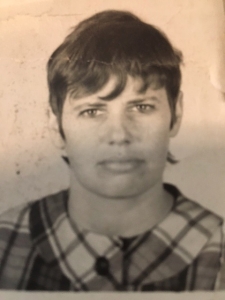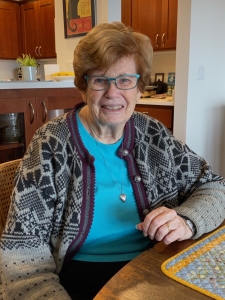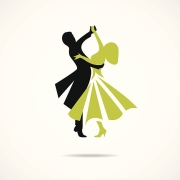Betsy Portaro- One of the Very Early Peace Corps Volunteers Danced with Belafonte
This is one of the last two of our series on the experiences of RVM residents in the Peace Corps. Also in this issue is the article on David Guzetta and Carolyn Auker. The December issue featured Jean and John Herron and Russy and Anita Sumariwalla; the November issue contained articles on Joni Johnson and Asifa Kanji and David Drury.
by Joni Johnson
Betsy Portaro joined the Peace Corps in 1963 shortly after graduating from college, only two years after the Peace Corps started. She spent two years in Guinea, West Africa. Her major at Boston College had been Psychology but she had studied French while in high school and college and so she entered the Peace Corps light years ahead of most of the volunteers destined for the Republic of Guinea which had just received its independence in 1958. Her program planned to send two types of groups to that country. One was for an agricultural project and the second was for teachers of English as a Second Language. Oddly enough, she first entered as part of the agricultural team to keep company with one of the wives in that group so that there would be more women in a group made up largely of men.
You can see the Betsy of today in the Betsy O’Connell of 1963. She was feisty and brave and adventuresome. She wanted to join the Peace Corps for a variety of reasons. It’s connection to JFK was very appealing. But most of all, she wanted to see the world.

The first part of her training took place in Vermont at a school for International Living that was relatively empty in the summer. There were approximately 35 people in her agricultural group. The second group, training nearby to be ESL teachers, were mostly women. The training in the US was a combination of physical training (boot camp) and language studies as well as understanding the Guinea culture. After two months, the two groups were taken by plane to Conakry, the capital of Guinea where the last part of the training would take place. Within a month of their arrival, Kennedy was assassinated. As you can imagine, the volunteers were in shock. Many Guineans knew little about the world outside of their own country. There were few TV’s and radios. But those that had heard the news offered sympathy to the volunteers. It was a very difficult time and everyone was heartbroken.
During their last month of training, this time in Conakry, the volunteers would practice their French and get used to the culture “in vivo”. Betsy remembered that the boys had to learn how to spit in order to be accepted. The main religion was Islam (currently at 85%) which meant that the women often wore burkas or at least a veil. And most of the men kept their distance. Betsy remembered that the men in the city wore long robes and the men from the country wore short robes. The women volunteers were told to wear simple dresses that came slightly below the knees
Guinea was a beautiful country. There were three major tribes and then smaller tribal groups in the various regions. The mountains had the best weather. The coast was extremely humid and the desert was hot and to the volunteers, felt airless. Conakry was on the coast with a high humity and a climate considered tropical monsoon. One of the tribes was heavily business oriented and was thrilled that the Americans were coming. However, it was a bit of a disappointment since most of the volunteers could buy very little on their $50 a month allotment.
.Betsy’s first job for the Peace Corps was working as a social assistant in a hospital helping the supervisor translate anything into English and welcoming the new patients that were ambulatory. However, after a short time, Betsy was transferred to the city of Labé (Tropical Savannah climate at an altitude of over 3000 ft) to teach English as a second language in the high school there. Labé is currently the second most important city economically in Guinea even though its population is rather small (about 200,000). I am sure that in 1964, it was even smaller. Betsy was called Mademoiselle Teacher throughout the rest of her stay in Guinea. During her second year, she moved again, this time to KanKan (Also with a tropical Savannah climate but significantly hotter than Labé) where she taught English to 9th and 10thgraders. The head of the school there had only one ESL book and asked Betsy to get more copies from the Peace Corps. They managed to scrounge up six more books. So the students would sit together at round tables and share the books with one another. Because this was the first group of Peace Corps volunteers that served in Guinea, the Peace Corps didn’t know what they would need to fulfill their tasks.
Even in the early years, the Peace Corps fulfilled its three major goals:
- To help the people of interested countries in meeting their need for trained men and women.
- To help promote a better understanding of Americans on the part of the peoples served.
- To help promote a better understanding of other peoples on the part of Americans
While we don’t have much information about the results of the agricultural unit, certainly the ability to offer ESL classes given by native speakers who were there to meet and share their lives with the residents of their host country definitely met the Peace Corps criteria for success.
Here are some of Betsy’s quotes:
“They loved that I was an American. Most of them had never met one. And they were impressed that I had traveled so far to be with them. They were all interested in my hair and the color of my skin.
“I found that some of the culture was difficult for me because it felt as if women were treated as second class citizens. Very few were in the government. Some were teachers.
“I loved being in the Peace Corps. I would always talk with the students after school because they wanted to spend more time with me. At the end of my stay, it was difficult to leave, but at the same time, I was ready to come home. I missed my family and I missed the ease of life in the United States. The Republic of Guinea was a very poor country, but also felt very glamorous for me. After I had been there for a year, half the people knew who I was. This did not happen in Boston. And when I returned, I really didn’t leave the Peace Corps completely behind. I worked for them in Washington DC for over a year.

“And yes… Thanks to the Peace Corps and the Republic of Guinea, I danced with Harry Belafonte. He had come to Conakry for almost a week in search of dancers for his company. He asked me to dance. I almost passed out!”




Thank you Betsy, for sharing your experience in the Peace Corps. It must have made an impression on you through your life.
Tom’s brother after he retired spend two years in Peace Corps.
Sophia